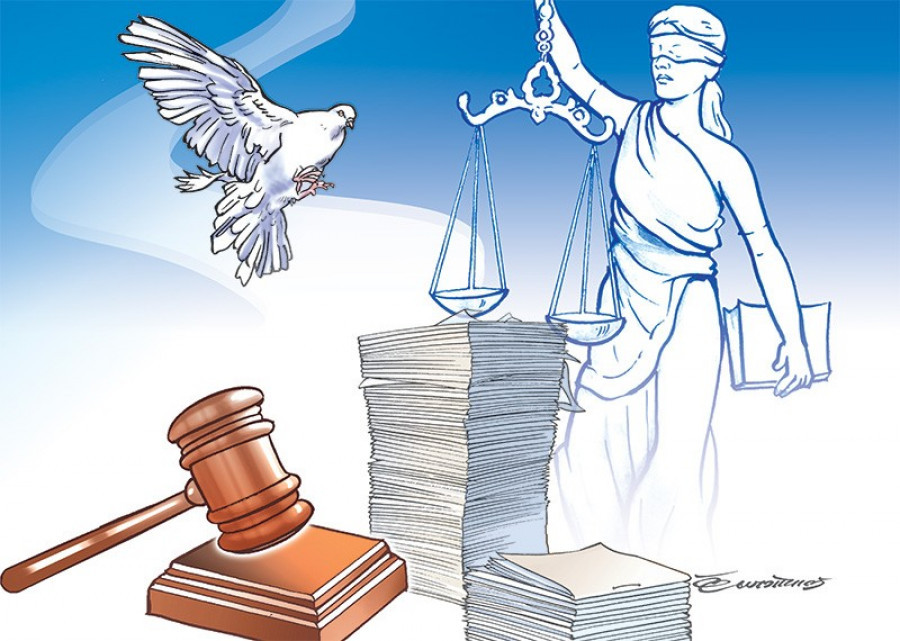National
After deal between parties, selection panel publishes list of probable candidates for transitional justice bodies
Conflict victims object to political interference, saying they won’t accept the officials selected without following the due process.
Binod Ghimire
Three days after an agreement among the parties on the names to lead the two transitional justice commissions, the recommendation committee on Monday published a list of 61 probable candidates, including those who were relieved of their duties in April, for member’s posts.
Following criticism from different quarters, including conflict victims and rights activists, that chairpersons and the members of the two commissions failed to perform their duties during their four-year tenure, the government had decided to bid farewell to them through an amendment to the existing Transitional Justice Act.
However, the recommendation committee has included eight among the ten officials who were in the Truth and Reconciliation Commission and the Commission of Investigation on Enforced Disappeared Persons, which many say is part of the plan to reappoint them.
The leaders of the Nepal Communist Party and the Nepali Congress on Friday had agreed to pick Ganesh Datta Bhatta, an associate professor at Nepal Law Campus, for the post of chairman in the truth commission and repeat same old faces, including the chair, in the disappearance commission.
Along with Bhatta, Gangadhar Adhikari is the only new member to be inducted in the truth commission, while its three members from the former team—Shree Krishna Subedi, Madhabi Bhatta and Manchala—are set to retain their posts. The entire set of the disappearance commission led by Lokendra Mallick, which includes Bishnu Pathak, IB Gurung, Bijul Bishwokarma and Nara Kumari Gurung, too will be repeated.
“We won’t accept direct interference of political parties,” Bhagi Ram Chaudhari, chairperson of Conflict Victim’s Common Platform, an umbrella body of different victim’s group, told the Post. “We must know why they were ousted if they were competent enough to lead the commissions.”
According to Chaudhary, the victims will have to look for support from the international community if the government and the parties don’t refrain from making undue interference not only in the appointments but also in the whole transitional justice process.
Leaders of the victims’ groups have also said that they are surprised as to why a committee led by the former chief justice failed to take an independent decision.
A total of 57 people had applied for the posts of chairmen and members of the commissions, including some from the previous teams.
The recommendation committee found 54 of them eligible and added seven others on its own and published a list comprising 61 names.
The proposal to add new members was brought by Ram Prasad Mainali, Sharmila Karki and Prem Bahadur Khadka, who represent then CPN (Maoist Centre), CPN-UML and the Nepali Congress, respectively, on the committee.
Defending the move of the committee, Karki said no law stops them from inducting the old faces.
“We have just shortlisted the candidates. The final recommendation will be made only after going through complaints against them,” Karki told the Post. Anyone who has complaints against the shortlisted candidates can register them by Friday.
Gopal Shah, chairman of the Conflict Victims National Network, another umbrella body of the victims, said they are against the process to pick the chairpersons and the members. He said the names were shortlisted without adopting any proper criteria.
“The recommendation committee, parties and the government are trying to play with the sentiments of the victims,” Shah told the Post.
The list of the candidates also includes senior advocate Arbind Kumar Singh, who had gone missing after a bus he had boarded plunged into Trishuli River on August 9.
But Karki said they included him in the list because there is no confirmation about his death.
Prakash Osti, a member on the recommendation committee who represents the National Human Rights Commission, too said he is not satisfied with the recommendation process.
According to him, though a criterion was formulated for the selection process, that was completely ignored.
The commission has been saying it will withdraw Osti from the committee if it doesn’t follow the due process during the selection.
“The commission will decide on my upcoming role on the committee,” Osti told the Post.




 11.12°C Kathmandu
11.12°C Kathmandu














